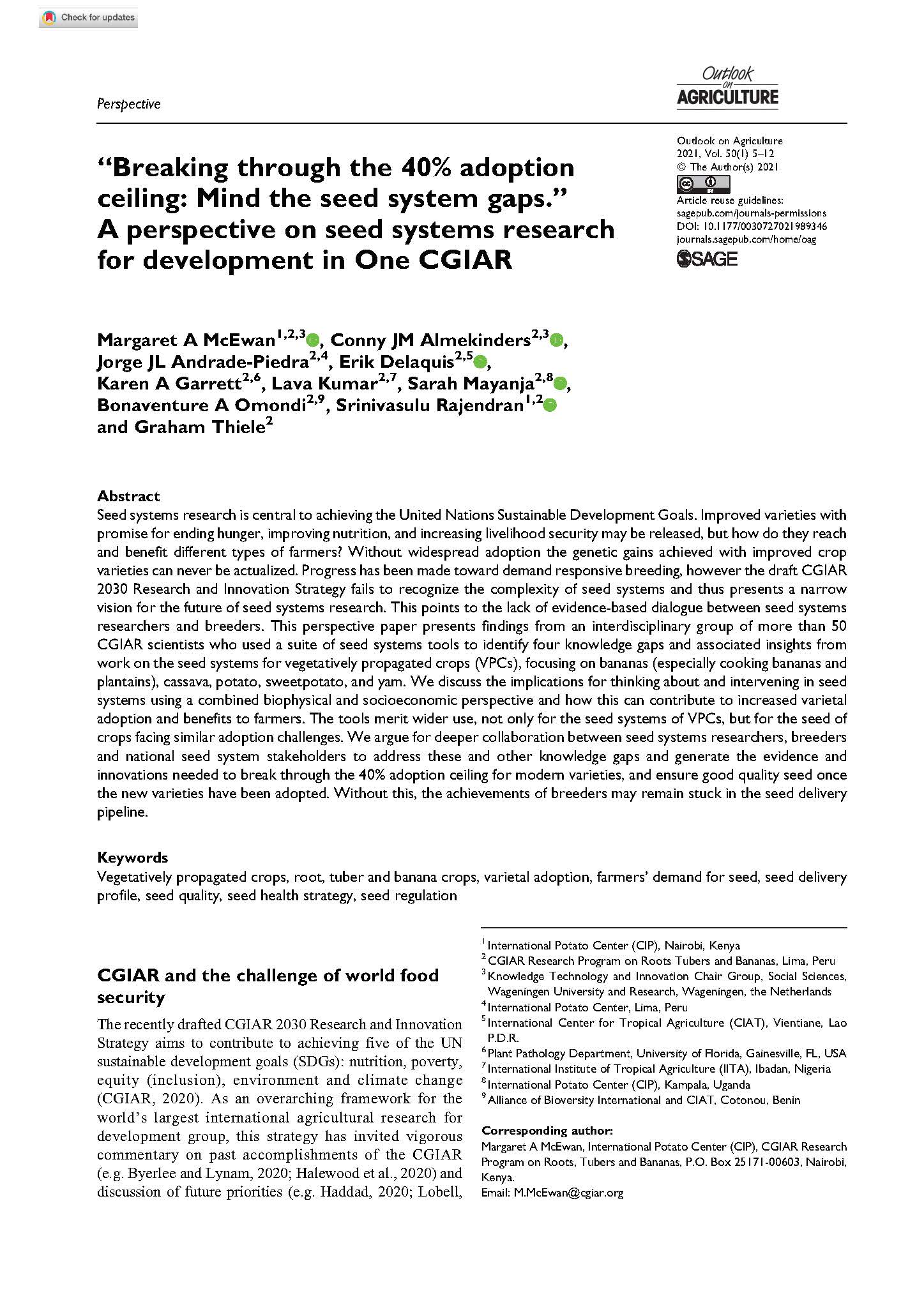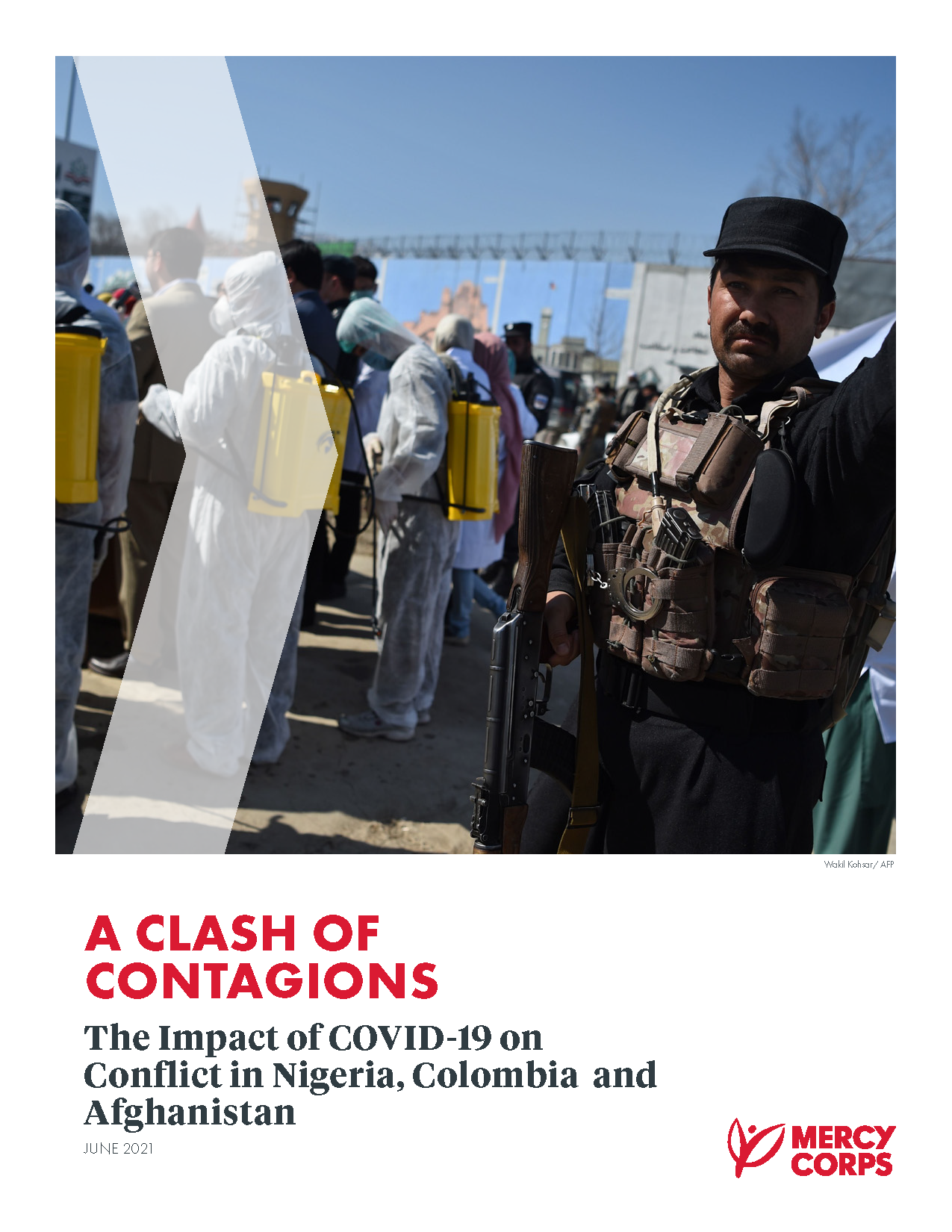Search Results
Risk Communication and Community Engagement: Learning from Successes and Mistakes as We Move Through the Pandemic and Beyond
View Recording This event was a session at the Food Security COVID-19 Learning Event. As the COVID-19 pandemic struck, many food security activities had to quickly adjust and integrate Risk Communication and Community Engagement (RCCE) components into their ongoing programming, such as including information at food distribution sites, through radio broadcasting, addressing rumor monitoring and developing feedback loops with community members, among many others. All these RCCE efforts were implemented alongside other longer-term social and behavior change work and with a backdrop of stigma and mis/disinformation about the COVID-19 pandemic. Grounding our discussion in what did and did not go
A Perspective on Seed Systems Research for Development in One CGIAR
Authors:
Outlook on Agriculture
Sector Type:
Agriculture and Livelihoods
Year Published:
2021
Call for Case Studies: Models for Strengthening Last Mile Seed Production and Distribution in Fragile Contexts
About Over the years, donors and humanitarian organizations have increased their investments in the development and transfer of agricultural input innovations including seeds. However, these technologies seldom reach smallholder farmers in remote locations due to constraints associated with access, availability and quality. These constraints are more pronounced in fragile contexts in which unstable operating conditions result in less effective seed systems, without the institutional capacity to produce, distribute and control seed quality. ISSD Africa , through the Mercy Corps-led action learning activity Developing the Seed Sector in Fragile states , and the USAID Bureau for Humanitarian Assistance (BHA)-funded SCALE awardAnalyzing Seed Systems in Fragile Contexts
Watch Recording Seed systems in fragile states differ from those in more stable environments and offer unique opportunities and challenges. In order to deliver effective support services in conflict settings, humanitarian agencies, donors and other stakeholders need to understand these differences, as well as how to address them with context-appropriate interventions. The Mercy Corps-led ISSD Africa Action Learning Topic, Developing the Seed Sector in Fragile States, aims to deepen understanding of seed systems challenges and opportunities in fragile states and identify practical seed interventions entry points for humanitarian agencies, donors and other stakeholders. As part of these activities, ISSD AfricaCreating Viable and Sustainable Sanitation Enterprises
Why do some sanitation enterprises thrive and others fail? Join us to discuss the viability and sustainability of sanitation enterprises. The USAID-funded Water, Sanitation and Hygiene Partnerships and Learning for Sustainability (WASHPaLS) Project invites you to a webinar where we present guidance for practitioners on the factors impacting the viability and sustainability of sanitation enterprises. Profitable sanitation enterprises are critical to attract and maintain entrepreneurial participation for scaling sanitation markets. However, the factors that result in some enterprises performing better than others, or indeed, why some enterprises fail, are not well understood. The webinar draws upon a recent WASHPaLS reportEmpowering Field Agents and Staff in the Face of Dynamic Change
Watch Recording View Presentation This event was a session at the Food Security COVID-19 Learning Event. COVID-19 required implementing partners to increasingly rely on the knowledge, skills, and decision-making of field-based staff, agents, and volunteers. Decentralized decision-making became a necessity to meet activity stakeholder needs, and implementing partners achieved this in different ways in different contexts. This session highlighted practical examples of activities encouraging staff for greater decision-making agency related to activity programming. After short presentations from East Africa and Southeast Asia, participants went into small groups and shared their own experiences of increased decision-making agency at the field levelEnhancing Partnership Models Between International and Local Partners
Watch Recording View Presentation This event was a session at the Food Security COVID-19 Learning Event. While the food security implementing community has been on the path towards greater localization in recent years, the pandemic has accelerated and expanded opportunities for partnership between international non-governmental organizations (INGOs) and local partners. Partnerships between INGOs and local NGOs can take various forms, but the COVID-19 pandemic has presented new opportunities and challenges in structuring partnership agreements to empower local partners. The aim of this session was to share examples of different approaches used to institute partnership agreements between INGOs and local NGOs
A Clash of Contagions: The Impact of COVID-19 on Conflict in Nigeria, Colombia, and Afghanistan
Authors:
Mercy Corps
Sector Type:
Emergency Response |
Monitoring and Evaluation
Year Published:
2021